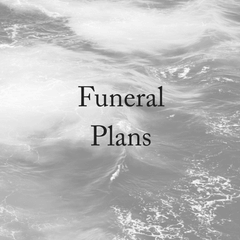
Do you have a funeral plan? Planning a funeral or saving for a funeral seems a little morbid. But the reality is that we’re all going to die and a funeral is part of the inevitable. What doesn’t need to be inevitable is certain financial strain and conflict about what kind of funeral to have. There are also other decisions surrounding your death that need to be made at a time of high emotion for your family. Planning for your death will show your love even after you’re gone.
[Tweet “Planning for your death will show your love even after you’re gone.”]
It’s common to put off making a funeral plan. When it comes to death, many of us are good at procrastinating. We may not have any control over when we die, but we do have control over what kind of funeral we’d like to have and what our death will mean for our families. But that time is coming. Who will pay for the funeral and how will it be paid for? What will happen to your body? Do you want to be buried or cremated? By planning ahead you will be making a difficult time much easier for your son or daughter, niece or brother.
A Funeral Plan for an Unexpected but Inevitable Death
When Diana’s mother Nicky died unexpectedly at 62, Diana was expecting Nicky’s first grand-child. What should have been a joyful and expectant time was stressful and emotionally  challenging, made more so by the fact that she and her mother had never discussed any end-of-life plans. “Mum had lived with respiratory issues most of her life but never talked about her health and she never talked about death and what she wanted, so no one was prepared,” says Diana.
challenging, made more so by the fact that she and her mother had never discussed any end-of-life plans. “Mum had lived with respiratory issues most of her life but never talked about her health and she never talked about death and what she wanted, so no one was prepared,” says Diana.
Although it’s now been a few years since her mother’s death, Diana still wishes she could visit a grave site at a rock-garden cemetery with a stream running through. At the time of her mother’s death, she and her sister Laura did the best they could without the financial means to pay for a “proper” burial. “Mum was one of 11 so we were able to ask family to contribute to the funeral costs until the proceeds of her superannuation came through, but the whole funeral-planning process was about what we could afford which just didn’t seem right,” says Diana. It was only with family’s help that they were able to pay for the basic funeral package which was $8700. The cost of a burial was going to be $15,000 so that was discounted early on. Diana and her sister kept their mother’s ashes at home until they felt comfortable about where to put them. “It was a beautiful service and Mum’s ashes are now under a favourite tree in grandma’s yard, but I would have preferred her to have a plot and a plaque and I know she would have liked that as well,” says Diana.
Planning for the Inevitable
Diana’s story is not an unusual one. Even though these conversations can be hard, not having them can be even harder. Nicky’s death prompted her 92-year-old mother to discuss her funeral plan with family members, including Diana. In turn, Diana had a similar conversation with her sister. She says, “It is not only about finding the money. Knowing someone’s wishes is just as important. In Mum’s case it would have taken away the feeling of ‘have we done everything she wanted?’.”
 In a very different experience, when Margaret Jenkins’ mother died unexpectedly of a massive stroke in 2005, Jenkins was overwhelmed with grief and expecting to make funeral arrangements. What she found when she and her step-father went to the funeral home, was that her mother had pre-planned her own funeral. “It was the greatest gift she could leave to me,” said Jenkins. “It was remarkable that she had done that. It was such a huge relief. To have to make funeral plans during such an emotional time is just pouring salt into an open wound. Everything was taken care of.”
In a very different experience, when Margaret Jenkins’ mother died unexpectedly of a massive stroke in 2005, Jenkins was overwhelmed with grief and expecting to make funeral arrangements. What she found when she and her step-father went to the funeral home, was that her mother had pre-planned her own funeral. “It was the greatest gift she could leave to me,” said Jenkins. “It was remarkable that she had done that. It was such a huge relief. To have to make funeral plans during such an emotional time is just pouring salt into an open wound. Everything was taken care of.”
Start by having a conversation with your loved ones about your funeral plan. Put it in written form as part of your estate planning documents. There are even online tools to help you think about all the different options you have. Australia’s first online funeral planning program Myendnotes allows users to specifically plan their own funeral, down to the songs they want played and the type of flowers they want displayed.
[Tweet “Start by having a conversation with your loved ones about your end-of-life plans.”]
The Cost
For those who can save and pay for their own funeral with just a regular account, you need to make sure that the money is easily accessible at the time to whomever is responsible for paying for your funeral. As Diana Eiszele discovered, funeral directors want payment at the time of the event – not months later when the proceeds of the deceased’s investments or estate are distributed.
It might be helpful to look into some other funeral planning options and make your own decision as to which is best for you. The three main options are: pre-paid funeral plans, funeral bonds and funeral insurance.
More than the monetary cost to consider when doing your planning is the investment you’re making to ensure that your death is as gentle as possible for your loved ones. While we may not have control over the manner in which we die or when, we do have the capacity to be planning and loving now though making our wishes clear and providing funds where possible to ease any future financial burden.
Good estate planning includes a funeral plan, as well as many other end-of-life issues. End-of-life planning is something we know a lot about at Estate Battles. Our experienced estate lawyers can offer you a free, 10-minute phone consultation. Please contact us today.

